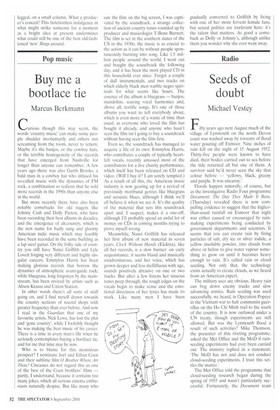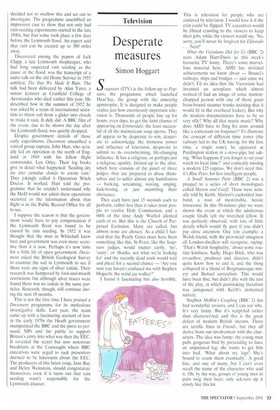Seeds of doubt
Michael Vestey
Fifty years ago next August much of the village of Lynmouth on the north Devon coast was washed away by torrents of flood water pouring off Exmoor. Nine inches of rain fell on the night of 15 August 1952. Thirty-five people were known to have died, their bodies carried out to sea before the tide returned all but one of them. A survivor said he'd never seen the sky that colour before — 'yellowy, black, greeny and purple. It was uncanny.'
Floods happen naturally, of course, but as the investigative Radio Four programme Document: The Day They Made It Rain, (Thursday) revealed there is now compelling evidence to suggest that the higherthan-usual rainfall on Exmoor that night was either caused or encouraged by rainmaking experiments being conducted by government departments and scientists. It seems that you can create rain by firing particles of salt, dry ice or silver iodide, a yellow insoluble powder, into clouds from above or below to give water vapour something to grow on until it becomes heavy enough to rain. It's called rain or cloud seeding. Not only that, the technology exists actually to create clouds, as we heard from an American expert.
The military uses are obvious. Heavy rain can bog down enemy trucks and slow advancing armies. Rain seeding was used successfully, we heard, in Operation Popeye in the Vietnam war to halt communist guerrillas on the Ho Chi Minh trail to the south of the country. It is now outlawed under a UN treaty, though experiments are still allowed. But was the Lynmouth flood a result of such activities? Mike Thomson, the presenter of this riveting programme, asked the Met Office and the MoD if rainseeding experiments had ever been carried out. The ministry replied in a statement: 'The MoD has not and does not conduct cloud-seeding experiments. I trust this settles the matter.'
The Met Office told the programme that cloud-seeding research began during the spring of 1955 and wasn't particularly successful. Fortunately, the Document team decided not to swallow this and set out to investigate. The programme assembled an impressive case to show that not only had rain-seeding experiments started in the late 1940s, but that some took place a few days before the Lynmouth flood. An expert said that rain can be created up to 300 miles away.
Discovered among the papers of Jack Clapp, a late Lynmouth shopkeeper, who had long suspected rain seeding as the cause of the flood, was the transcript of a radio talk on the old Home Service in 1955 entitled, The Day We Made It Rain. The talk had been delivered by Alan Yates, a senior lecturer at Cranfield College of Aeronautics who died earlier this year. He described how in the summer of 1952 he was asked by a team of international scientists to throw salt from a glider into clouds to make it rain. It duly did. A BBC film of the event, due to be shown the day after the Lynmouth flood, was quietly dropped.
Despite government denials of those early experiments, Document unearthed a retired group captain. John Hart, who actually led an operation in the north of England in 1949 with his fellow flight commander, Len Otley. Their log books give in detail what happened: 'Seeding dry ice into cumulus clouds to create rain.' They jokingly called it Operation Witch Doctor. It worked. Hart told the programme that he couldn't understand why the MoD would not admit these operations occurred as the information about that flight is in the Public Record Office for all to see.
I suppose the reason is that the government would have to pay compensation if the Lynmouth flood was found to be caused by rain seeding. In 1952 it was thought that the man in Whitehall knew best and government was even more secretive than it is now. Perhaps it's now time for a little bit of open government. Document asked the British Geological Survey to examine the soil in Lynmouth to see if there were any signs of silver iodide. Their research was hampered by foot-and-mouth restrictions but although silver traces were found there was no iodide in the same particles. Research, though, will continue during the next 18 months.
This is not the first time I have praised a Document programme for its meticulous investigative skills. Last year, the team came up with a fascinating account of how in the early 1970s the Heath government manipulated the BBC and the press to persuade MPs and the public to support Britain's entry into what was then the EEC. It revealed the secret but now notorious breakfasts at the Connaught where BBC executives were urged to sack presenters deemed to be lukewarm about the EEC. The producers of this latest coup. Jane Ray and Helen Weinstein, should congratulate themselves, even if it turns out that rain seeding wasn't responsible for the Lynmouth disaster.



































































 Previous page
Previous page